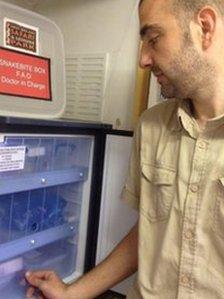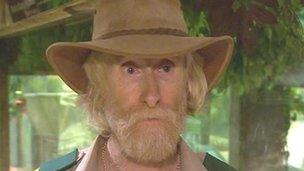Where do you get anti-venom in Worcestershire?
- Published

Daniel Hall said different snake bites required different treatment
Thousands of miles away from the African savannas, more than 165 species of exotic animals live in the heart of Worcestershire.
Many of West Midlands Safari Park's creatures could potentially pose a risk to their keepers.
But if something goes wrong, where do you find anti-venom near to Kidderminster?
On Sunday afternoon, the zoo's celebrity reptile keeper Mark O'Shea was bitten by his favourite snake, king cobra Sleeping Beauty, while she was being fed a rat.
The snake, the zoo's potentially most dangerous animal, carries enough venom in it to kill an elephant.
It had bitten Mr O'Shea's foot but did not puncture the skin, and he continued with his work, going on to do a show for visitors five minutes later.
But while on stage the muscles in his neck and tongue started to tighten. He came off and asked colleagues to start the "snakebite procedure".
"We immediately shut the reptile house to visitors," said fellow keeper Daniel Hall.
"With a cobra, their venom attacks a person's lymphatic glands, so the best thing you can do is apply a pressure bandage to stop it spreading further into the body.
"As Mark had been bitten on the foot, I bandaged up his entire limb up to his groin, and in the meantime the correct anti-venom was being fetched from first aid and the entrance to the park was cleared so the air ambulance could land."
Some venom is thought to have entered Mr O'Shea's body through old cuts in his foot but the anti-venom was not needed and the keeper left hospital within 24 hours.
On a wall in the reptile house's office is a board telling staff which colour-coded anti-venom is needed for which snake in an emergency, so it can travel with the patient to hospital.
On another is a stretcher, along with limb splints and first aid kits.
'Lift flesh up'
"Different snake bites need different treatment," said Mr Hall.
"With a rattlesnake, for instance, their venom travels through the bloodstream, so the best thing you can do to the patient is make them lie as still as you can to stop them from moving it further through their body themselves.
"You don't want to apply a bandage to that because - with the nature of the bite - it's more likely to lift part of the person's flesh up at the same time."
Several times a year the zoo practises drills with the nearby Worcestershire Royal Hospital, testing different scenarios from a large fire to a big cat escape and snake bites.
Rose Johnson, medical director at the hospital, said the accident and emergency department was well-rehearsed and doctors would consult exotic illness specialists elsewhere in the UK if needed.
The zoo's stocks of anti-venom come from specialist laboratories across the world, and always have to be kept fully stocked.
"They can be very, very expensive," said Bob Lawrence, the safari park's director of wildlife.
"It can cost about £1,500 a time and even with something like an adder, which we have in the wild over here, the anti-venom has to come from Croatia.
"But it's a necessary expense."
'In awe of them'
Mr Hall said Sunday's incident was the first he had experienced in his six years at the zoo and it did not change the way he felt about the snakes.

Mark O'Shea was released from hospital within 24 hours of the bite
"We're in awe of them," said Mr Hall, who worked as a prison officer before having a career change.
"We have to give them the utmost respect and always be aware of what they could potentially do."
It is not just the most dangerous animals keepers have to be wary of, Mr Lawrence added, pointing to a scar on his arm caused by a red deer calf.
"And the most painful bite I've ever had was from a common garden earwig. Blimey, that hurt.
"It goes to show that it doesn't matter if you're in the bush in Africa or just lifting a bag of spuds, you can never be too careful."
- Published21 August 2012
- Published20 August 2012